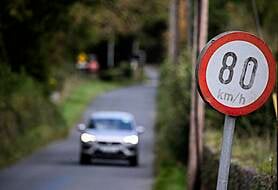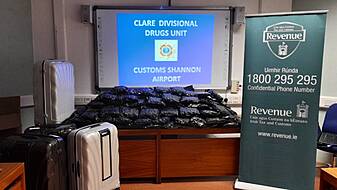Former Republic of Ireland footballer Anthony Stokes was caught with almost €4,000 worth of cocaine in his car after leading gardaí on a high-speed pursuit in Dublin, a court has heard.
The ex-Celtic and Sunderland player hit 160 km/h and nearly collied with another motorist shortly after midnight on January 6th, 2023.
Judge Grainne Malone adjourned sentencing Stokes, 36, for a treatment report to confirm he is off drugs.
He pleaded guilty at Dublin District Court to unlawful possession of cocaine which was hidden in a sock, and having the drug for sale or supply. The judge heard how his drink issues spiralled into cocaine addiction when his football career ended.
Stokes also admitted driving while over the alcohol limit and four counts of dangerous driving.
The former Premier League star has also pleaded guilty to not producing a driving licence and not having motor insurance.
In evidence, Garda Radoslaw Konczewski recalled observing the ex-footballer’s car speeding on Walkinstown Avenue at around 12.20 am. The officer activated his patrol car lights, but Stokes failed to stop and continued to the Long Mile Road junction, "which he entered at speed, breaking a red light".
Stokes drove to the Naas Road and broke another red light at a major junction and continued to Ballyfermot Road, breaking two pedestrian red lights and one at a junction.
The father of three continued to Kennelsfort Road Upper, broke a red light, and "almost collided with a car on the Chapelizod bypass".
The accused, who had a passenger in the car, went to Knockmaroon Road and stopped at the closed gates of Phoenix Park. Stokes abandoned the car but was caught following a short foot pursuit.
The chase lasted about 10 minutes.
Garda Konczewski estimated that Stokes had reached speeds of 160km/h at times and around 140km/h when he was going through Ballyfermot village.
Gardaí brought the car to Crumlin station. Cocaine worth €3,700 was found in wraps inside a sock, kept in the air vent on the driver's side. His DNA was also found on the sock.
He also provided a urine sample, which resulted in 59 mg of alcohol per 100 ml of urine, which was over the limit.
The garda agreed with defence solicitor Lorraine Stephens he was "fully co-operative" at the station, provided a sample and "he was a pleasure to deal with".
The court heard that Stoke had one prior conviction in this jurisdiction in 2013 for assault causing harm, which resulted in a suspended sentence and compensation order.
Ms Stephens pleaded with the judge not to jail her client, who has three young children, adding that he was very worried and "realises the precarious position he is in".
In the mitigation plea, she said he had been a talented footballer scouted at 14 from Cherry Orchard Football Club in Dublin by Arsenal in London. The court heard that he began playing for Sunderland when he was 17, and he went on to more success with Celtic in the Scottish league.
However, he had laboured under addiction from a young age.
His adoptive parents moved over with him to help their son pursue his dreams, but after he turned 16, he began abusing alcohol. That problem, the solicitor said, progressed at the end of his career to cocaine abuse, which he was "heavily using at the time of this incident".
The court heard that he reacted badly to the end of his career.
Ms Stephens said he was now clean and sober and has linked in with an addiction service. The judge noted he was due to give a sample later this month to show he was drug-free.
The court heard that he had a difficult start in life and was adopted by loving parents at the age of two after his biological mother had difficulties.
The judge heard he had also developed gambling problems and was featured in a documentary highlighting difficulties and mental health difficulties for up-and-coming footballers without parental supervision at a very young age.
Asked by the judge about the manner of his driving, the solicitor stressed she was not minimising it, but some of the roads would have been empty. However, Judge Malone noted the evidence of the near collision.

Ms Stephens said it was an isolated incident, and he was "under the influence at the time".
The court heard Stokes's girlfriend was prosocial and a calming influence, and she did not tolerate drug use. He also had the support of his adoptive parents and lived with his biological mother.
Ms Stephens said that following a period of denial, he was now making huge steps toward "total abstinence" to address the difficulties that led to him being in court. She said he would do anything to avoid jail.
Adjourning sentencing until October 1st for the results of his drug tests, she remarked that she took a very serious view of his driving and will hear more evidence about that aspect of the case on the next date.







